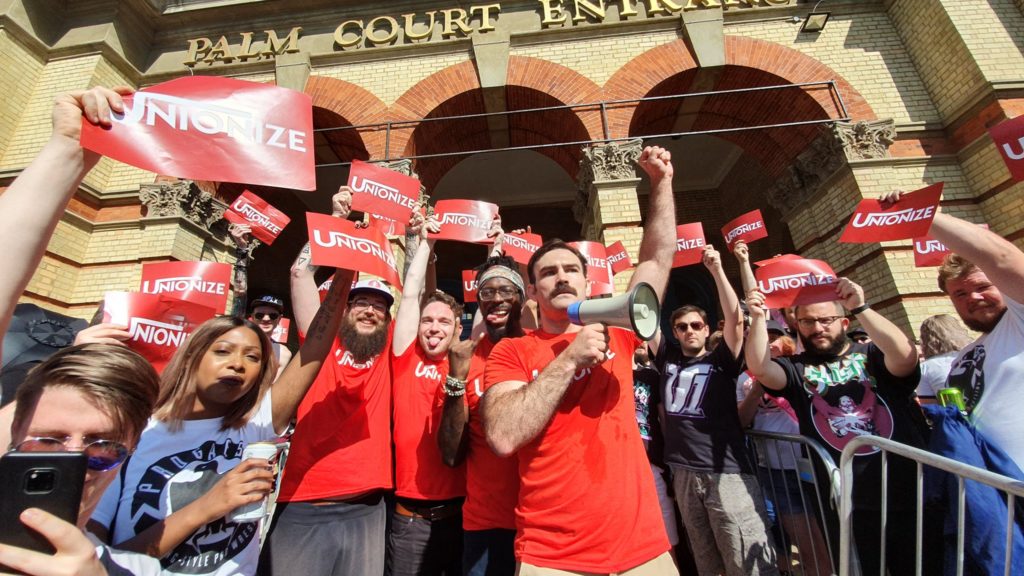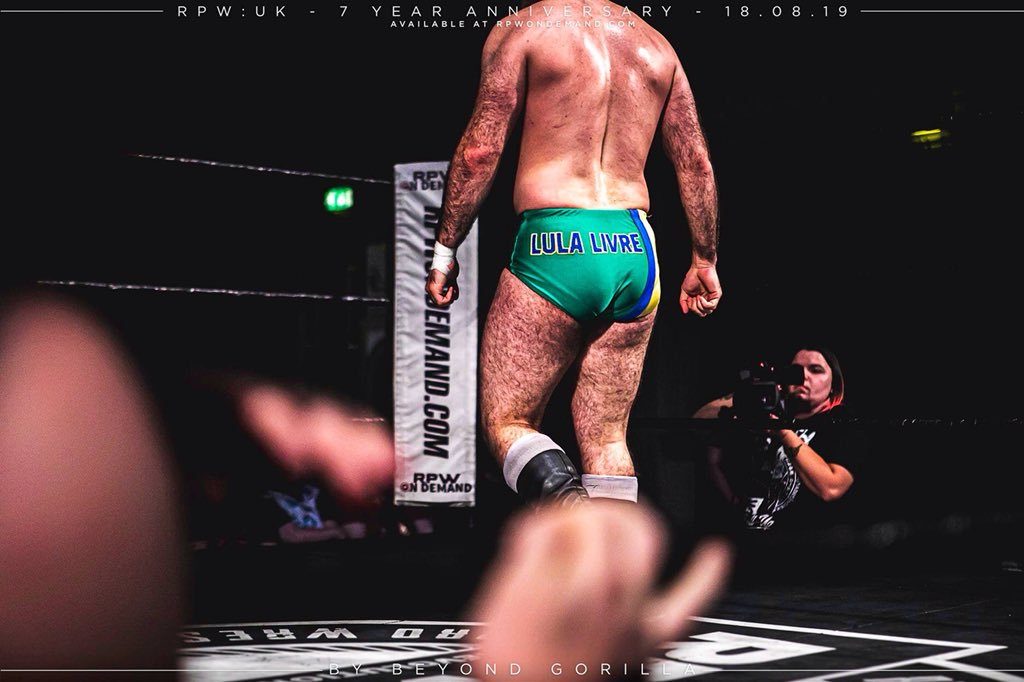
Wrestler and organizer David Starr at a rally for more rights and better conditions for wrestling talent
By now, almost everybody knows that professional wrestling is a “worked” sport—requiring wrestlers to advance storylines, choreograph matches and implement predetermined outcomes set by the industry’s bookers and writers. Yet the in-ring entertainment provided by these men and women can hardly be derided as “fake,” as the experiences of many wrestlers would attest. Stories of chemical dependency, early deaths, careers cut short due to injury, financial instability and more show how these workers have given their bodies to an entertainment sport that has been an incredibly imbalanced labor market.
As critiques multiply lambasting the app-based gig economy for its denial of basic worker protections, similar attention is due one of the nation’s first gig economies—professional wrestling—and the challenges that are building there against the status quo.
Background
Before we get started, it is important to lay out a basic primer of what the wrestling landscape has been and is for the industry’s talent, including wrestlers, referees,
and other employees engaged in the promotion and production of matches.
Originally, the first wrestlers were legit tough guys, taking on spectators that entered the ring to challenge them. Over time, real “shoot fights” faded, and a demand for a more performance-based style grew. Various territories developed in the different geographic areas of the United States and Canada, with promoters in the National Wrestling Alliance cartel largely agreeing to share talent, run only their area and help stave off any non-member promotions from gaining a foothold. When Vince McMahon, Jr. purchased the then-World Wide Wrestling Federation (now World Wrestling Entertainment (WWE)) from his father in 1982, he began a campaign to expand his company’s territory nationally. This included inking television deals with stations across the US and Canada, as well as making lucrative offers to each territory’s top stars to bring them exclusively under the control of McMahon’s entity.
Forgoing a long story about inter-promotional battles, the WWE’s nationwide expansion marked the death knell for the territorial model, and later successes even saw McMahon purchase his most heated rival, World Championship Wrestling, in 2001. Since then, there have been other companies, but none could challenge the WWE in production value or market penetration. Even now, critics argue that the WWE is vacuuming up talent from the international and independent scenes, either by signing them to contracts or developing feeder relationships with various companies.
The Issues

David “The Product” Starr in the ring
Over the summer, I was able to talk with independent professional wrestler David Starr about the overlaps between wrestling labor and other worker struggles; what can be done to help improve things for the people that give their bodies in the squared circle; and his July 4, 2019 launch with photojournalist James Musselwhite of We The Independent, the unionization effort for wrestling talent.
Starr noted that, much like the labor struggles of working-class people under capitalism demanding better pay and conditions, wrestling “is just an extremely imbalanced business. I think honestly outside of adult entertainment … pro wrestling might be the most exploited form of entertainment … If you look at the profit numbers that are being given back to workers and consider the work that is being put out there for people to make profit, there is a huge disparity.”
Starr continued, “When your number one priority is maximizing profit over taking care of your people, that’s when you get wealth disparity and that’s when you get this idea that the people at the top that … can collect tens of millions of dollars in bonuses but they can’t seem to write paychecks that afford somebody the ability to live, then that’s where we get this issue.”
A notable driver of that disparity and connective to the gig economy’s lack of labor protections, currently being roundly criticized by state legislators and multiple presidential candidates, is the designation of workers as independent contractors instead of as employees. While app-based businesses like Uber and Lyft are the current face of the ire over using this label to deny essential employee benefits, this has long been the norm for in-ring wrestling talent hired by Vince McMahon, Jr.
In April, 2019, just days before the biggest WWE show of the year—WrestleMania—John Oliver’s HBO program Last Week Tonight took on the farce of labeling WWE’s talent independent contractors. The program used the government’s own definition of independent contractor to show that this designation makes little to no functional sense, and turns the idea of “independent” on its head in all ways—except as a potential method for capital to avoid paying out health care, pensions and other benefits.
As former Minnesota governor Jesse Ventura, a longtime wrestler who attempted to unionize industry talent in the 1980s, noted, “How are they self employed when they’re signed exclusively? … They’ll tell you when and where you’ll work. They’ll tell you who you’ll work. They can totally control your life.”

“The Product” sporting wrestling trunks supporting imprisoned former leftist President of Brazil Luiz Inácio Lula da Silva
The lack of benefits like pensions and health care bears scrutiny, since, as Starr said in our interview, “Vince McMahon is a billionaire based on the fact that wrestlers have broken their bodies for him.” Some wrestlers have had to crowdfund surgeries to help fix nagging problems that came from their years of ring work. Talent who have faced injuries or can no longer perform have no pension, and likely are not receiving royalties when subscribers stream one of their old matches or segments on the WWE Network (a $9.99 per month subscription going into McMahon’s coffers).
There is also the issue of talent who have died or are at risk due to chemical dependency issues. The WWE wellness policy announces that they will pay for rehab as often as needed for any signed talent. However, this is hardly the panacea that the company may think it is. It does not scratch the surface of the alleged pressure to work through injuries, the 220-plus dates per year talent are asked to work, the wear and tear that puts on their bodies and the lack of an off-season for wrestlers. All of these factors contribute to the routine use of opioid painkillers.
What can be done?
Just as we’re seeing a more militant labor movement developing to rightfully classify workers for gig apps like Uber and Lyft as employees, a similar campaign to empower wrestling talent has also begun. Musselwhite and Starr began We The Independent to work with industry talent. As they explicitly note, none of their criticism is meant to cripple the industry’s corporate interests. The purpose is to press it to do better for those it has signed.
Starr and Musselwhite’s effort seeks to sell merchandise to subsidize memberships in Equity, a British trade union, that can provide legal advice for contracts, recourse in disputes as well as pensions and disability payments for its UK-based members.
Although just months old, the efforts are expanding further, with an upcoming organizing workshop taking place at the end of October with the London chapter of the Industrial Workers of the World. Further relationships are developing between We the Indie and others as time progresses.
We The Indie demands provision for workers generating so much brand value for both the corporate wrestling scene and more local independent operations. While smaller companies may not have the money that other promotions do, they can take smaller measures, like ensuring that water is available, having their referees CPR-certified and having medical staff at the venue.
We fans have a say, and we can demand that justice is served for all workers in the gig economy whether they drive cars or their opponents into the mat.
To hear the entire interview with “The Product” David Starr, listen here.
